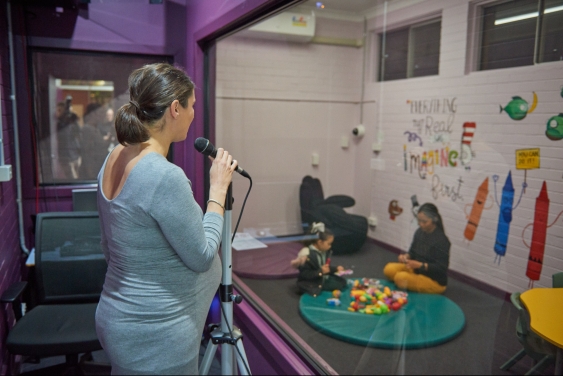Support offered to those struggling to manage severe behavioural problems in children

The University of New South Wales (UNSW) Sydney has partnered with a network of public pre-schools and primary schools in south western Sydney to establish one of the world’s first school-based clinics to provide evidence-based early intervention to young children with severely disruptive behaviour.
The outreach clinic was officially launched at Ingleburn Public School yesterday by Associate Professor Eva Kimonis, program director and clinical psychologist from the School of Psychology at UNSW Science.
During the first year of the clinics operations more than 1000 children will be assessed, with a specific form of intervention, known as Parent-Child Interaction Therapy (PCIT) offered free of charge to identified at-risk children, their educators and their parents.
The clinic will be run from Ingleburn Public School but will operate across the greater Campbelltown area and include students from Macquarie Fields Public School, Sackville Street Public School, St Andrews Public School, Robert Townson Public School, Warwick Farm Public School, and Campbelltown Community Preschool.
The PCIT program provides evidence-based treatment for children between the ages of two to seven years who display disruptive behaviour problems. About 6 per cent of Australian children have disruptive behaviour disorders, putting them at risk for future school failure and dropout, family violence, mental illness, and criminal behaviour.
Programs such as PCIT provide an important way of bridging the gap between clinical research and practice, Associate Professor Kimonis said, noting that there were excellent evidence-based treatments that many families are never able to access.
“These children tend to have early-starting conduct problems that negatively affect their home and education environments. There are a whole host of negative things that are likely to eventuate downstream for these children, their families, peers and teachers if we don’t address those problems early enough.” she added.
Associate Professor Kimonis said that such trajectories were typically visible from a young age, noting that by preschool age, those working with children closely “can reliably identify when a child’s disruptive behaviours are at a level that require intervention.”
Children will be invited to participate in the PCIT program through either identification as at-risk through a school-wide screening, by teacher referral, or where they are struggling to transition from preschool to kindergarten.
Ingleburn Public School principal Graeme Green, who was at yesterday’s launch, said he hoped the clinic model would be so successful that it would spread into schools in the greater Sydney metro area.
“Nothing like this has been done before in a school setting. We are empowering our students to become collaborative, innovative global citizens, and this program will help them get there,” he said.
The Parent-Child Research Clinic was founded at UNSW Psychology in 2013 by Associate Professor Kimonis, who is its director. In 2016, the clinic published a ground-breaking study showing that indications of callous-unemotional traits which describe children low in empathy and remorse can be reliably observed in children as young as age three.
As a result, Associate Professor Kimonis developed an enhanced PCIT treatment to target the unique needs of children with callous-unemotional traits because of their poor response to existing evidence-based treatments. She plans to deliver both standard and targeted versions of PCIT at the Ingleburn clinic.
Research has shown that PCIT reduces children’s disruptive behaviours, improves parenting skills and overall family functioning, reduces parental stress levels, and has lower dropout rates than other parenting interventions.
Standard PCIT has two phases delivered via real-time coaching of parents using a wireless headset from behind a one-way mirror by a therapist. The intervention typically involves between 14 and 21 weekly one-hour sessions.
Support for educators is also a core component of the program, with other interventions occurring in partnering schools, including a general parenting program and online teacher training that will be rolled out to help educators learn skills to manage disruptive behaviours.
The south-western Sydney area has been chosen to run the project because of the presence of vulnerable communities with pockets of significant disadvantage. Some families, groups and communities are characterised by financial instability and unemployment; poorer mental and physical health; and lower use of preventative services compared to the rest of NSW.
“Although there is some support for vulnerable families, some serious barriers can prevent them from accessing mental health services including lack of knowledge and understanding of the availability and cost of treatment, lack of child care, and long waiting lists. It is our goal to overcome many of these barriers by delivering PCIT directly in local schools,” said Associate Professor Kimonis.
“This community is fortunate to have such forward-thinking leadership at the seven participating schools. Our hope is that this world-first, grassroots initiative will achieve national recognition and serve as a model for schools across Australia.”
Those interested in learning more about the program may contact the UNSW Parent-Child Research Clinic via phone (02) 9385 0376, email [email protected], or through the website: http://www.conductproblems.com/contact/
Popular

Policy
Practice
Provider
Quality
NSW Government launches sweeping reforms to improve safety and transparency in early learning
2025-06-30 10:02:40
by Fiona Alston

Provider
Takeovers panel declines Mayfield Childcare application, refers matter to ASIC
2025-06-30 10:30:15
by Fiona Alston

Economics
Policy
Provider
Workforce
Prime Minister Albanese backs Tasmanian Labor’s childcare plan, highlights national early learning progress
2025-06-30 10:42:02
by Fiona Alston













